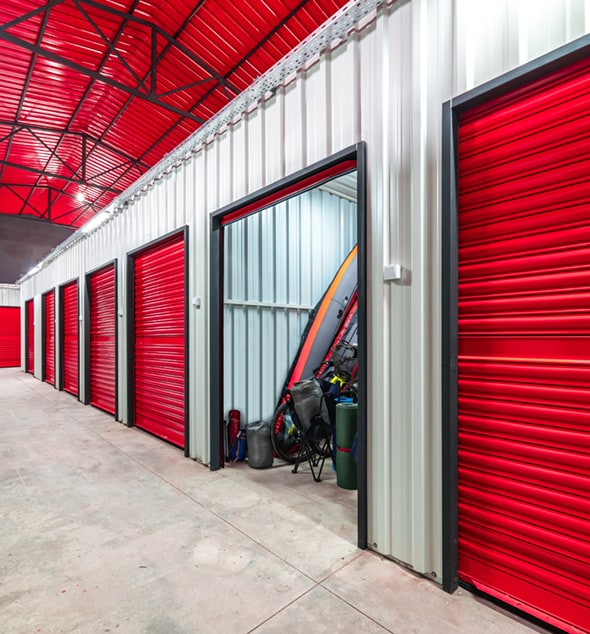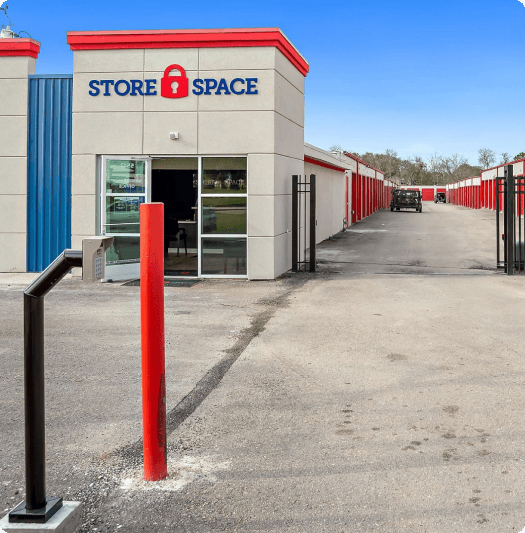How to Plan for a Garage Sale: 5 Steps to a Successful Garage Sale
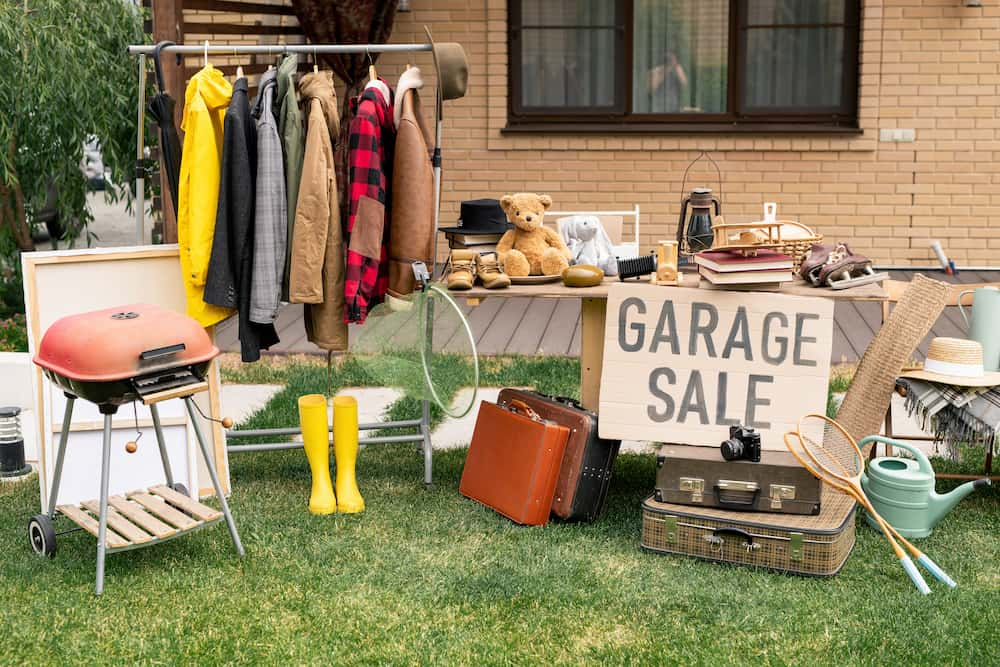
Buds of spring bloom,
Garage sale finds new life,
Treasures abound.
As spring and summer roll around, it's not just the flowers and warm weather clothing that start popping up. You’ll also find garage sales in full bloom this time of year!
Garage sales are a time-honored tradition in many American neighborhoods. They serve a couple of important purposes, including recycling items that one homeowner no longer needs but another can use, as well as a way to keep one’s house uncluttered. Plus, you might earn a couple of extra bucks along the way—what’s more American than that?
Keep reading for tips to set up your garage sale!
5 Steps to a Successful Garage Sale
When planning your garage sale, it’s important to consider the weather forecast and any holidays that may affect attendance. You should also take into account local events or festivals that could draw potential customers away from your sale.
There are five basic things to keep in mind when planning your garage sale:
1. Gather Your Items: Start by gathering all the items you want to sell at your garage sale. Sort through your belongings and decide what you no longer need or use. Make sure to check with friends and family members for items they may want to contribute as well.
2. Price Your Items: Once you have all the items gathered, it’s time to price them. Research similar items online or in stores to get an idea of what a fair price would be for each item. You can also look up pricing guides online for more specific items like antiques or collectibles.
3. Advertise: About two weeks before your garage sale, it’s time to advertise! Put up signs around town, post on social media platforms (such as Facebook or Nextdoor), and list it on local classified websites like Craigslist or Facebook Marketplace. If you have some items that will draw special attention, mention those specifically.
4. Prepare Your Space: Make sure your space is ready for the big day! Clear out any clutter and make sure there is enough room for people to move around easily and browse through your items without feeling cramped or overwhelmed.
5. Set Up Tables & Displays: On the day of the sale, make sure you have enough tables and racks to display all of your items neatly. Price everything clearly so customers know what they’re paying for. Have enough change for a twenty on hand (and more inside), as well as bags or boxes for customers who purchase multiple items.
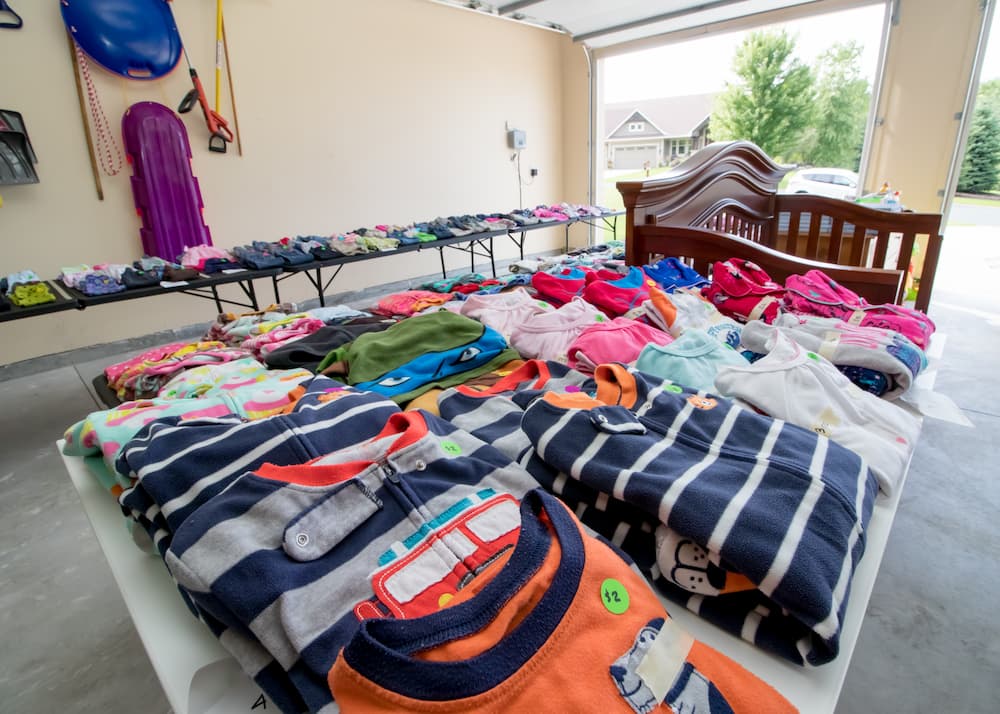
Pricing and Displaying at your Garage Sale
What items are people looking to buy at garage sales?
Shopping at garage sales isn't just for neighbors anymore. People will travel from far and wide to look for bargains to start their household, hidden gems that can be refurbished or resold, or a statement rug that really ties the room together.
People are looking to buy a variety of items at garage sales, including furniture, clothing, books, toys, electronics, home décor, bicycles, and more. It will largely depend on the neighborhood you're in as to what sells best, but don't be surprised if shoppers go out of their way to look for specific items, especially if you've advertised your sale.
How should you price items for a garage sale?
When pricing items for a garage sale, it is important to research similar items online (eBay, Mercari) or in second-hand stores to set an appropriate price for each item. Additionally, consider the condition of the item and any special features it may have when setting your prices.
It is also helpful to set different price tiers (e.g., $1, $5, $10) so that customers have options and can find something within their budget. Finally, don’t be afraid to negotiate with customers if they are interested in an item but feel the price is too high.
How should you display items at a garage sale?
When displaying items at a garage sale, it is important to make sure that all of your items are easily visible and accessible. Set up tables and displays so that customers can easily see all of your items at once. Additionally, consider grouping similar items together to make it easier for customers to find what they are looking for. Make sure to label each item with its price so that customers know how much they will be paying.
Do's and Don’ts at Your Garage Sale
Do: Have a multi-family sale
It is a good idea to invite your neighbors to participate in your garage sale. This can help draw more customers and create a larger selection of items for people to choose from. Additionally, it can be a great way to build community and get to know your neighbors better.
If you have multiple sellers participating in your garage sale, it is important to keep track of the items they are selling. One way to do this is by assigning each seller a number or code that they can use to label their items. You can also create a spreadsheet or list of all the items being sold and who is selling them, plus the final sales price. This will help ensure that everyone gets paid for their items at the end of the sale.
Pro tip: To get neighborhood kids involved, encourage them to set up a lemonade stand, or sell things like water bottles or popsicles.
Do: Advertise your garage sale
Some free or inexpensive ways to advertise your garage sale include putting up signs around town, posting on social media, and listing it on local classified websites. Additionally, you can reach out to friends and family members who may be interested in attending your sale. Finally, consider creating a flyer or postcard that you can distribute in the area to let people know about your sale.
Do: Be careful
Garage sales seem mostly harmless, but there are always hazards present from ne’er-do-wells, thieves and counterfeiters. Always try to have someone with you, don't let anyone into your house, and keep your money attended. Here are some more garage sale safety tips from American Family Insurance.
Don't sell these items
You should never sell items that are illegal, dangerous, or counterfeit at a garage sale. Additionally, you should not sell items that have been recalled by the manufacturer.
Resist the temptation to sell worn intimates (bras, underwear, swimsuits). If they are verifiably new (in the original packaging or have the original sales tag attached), it could be acceptable to sell these items.
It is important to avoid selling any items that could be considered offensive or inappropriate.
Remember: Garage sale etiquette
Some important garage sale etiquette to follow includes being polite and courteous to customers, respecting their space and not crowding them, and not becoming defensive or argumentative over prices. Most people like to haggle and typically expect some wiggle room in pricing (more so at garage sales than estate sales, but more on that later).
Additionally, be honest about the condition of items.
Finally, make sure to keep your area clean and organized so that customers can easily find what they are looking for.
If people show up to your garage sale too early or too late, try to be polite and explain that the sale hasn't started or has ended. Don't feel obligated to let anyone into your home or garage for any reason.
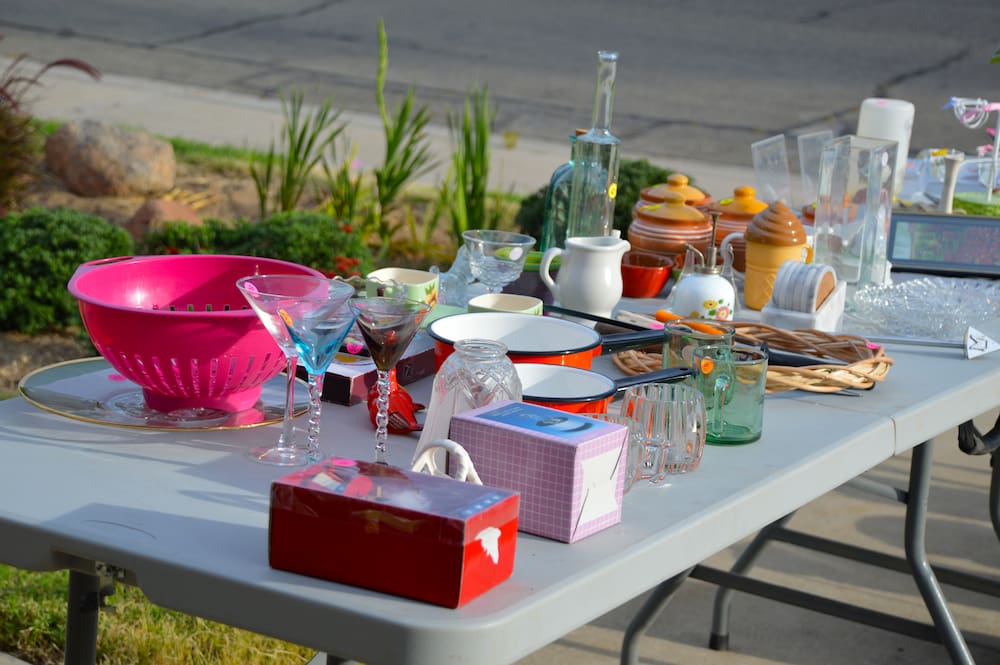
FAQs: More Things to Remember about Your Garage Sale
Q: What's the difference between a garage sale and an estate sale?
A: The main difference between a garage sale and an estate sale is the size and scope of the items being sold. A garage sale typically involves selling smaller items such as clothing, books, toys, electronics, home decor, etc., while an estate sale usually involves selling larger items such as furniture, antiques, collectibles, artwork, and other valuable items. Additionally, estate sales are often held to liquidate the possessions of someone who has passed away or is moving out of their home.
Estate sales are usually run by a third party, with the proceeds often going to pay debt or distribute among inheritors. While haggling at an estate sale isn’t strictly forbidden, it might be considered bad taste, especially if bereaved family members are involved.
Q: Are there local laws regarding garage sales?
A: There may be local laws regarding garage sales that vary from city to city. It is important to check with your HOA and/or local government to find out what the regulations are in your area. Some common regulations include limits on the number of days a sale can last, restrictions on signage, and requirements for permits. Additionally, some cities may require sellers to pay taxes on items sold at a garage sale.
Q: What if it rains?
A: If it rains during your garage sale, you will need to make sure that all of your items are covered and protected. You can use tarps or plastic sheeting to cover tables and other items. Additionally, you may want to consider moving the sale off the driveway and into the actual garage if possible.
Depending on where you live and the time of year, the sun may also be a consideration. Make sure you have enough sunscreen to go around, plus water to stay hydrated!
What Should You Do with the Stuff that Doesn't Sell?
OK, no matter how attractively priced you made Aunt Sophie's sombrero or the porcelain Sphinx cat figurine missing its left paw, maybe they just aren't going to sell this time around. That happens! If you have items that don't sell during your garage sale, you have a few options. You can store the items in a self-storage unit for future use or sale, or donate the items to a local charity or thrift store. You can also save the items for your next garage sale and try again!




